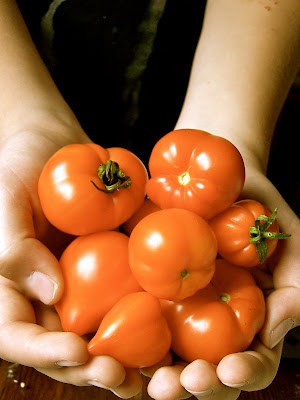
That being said, my crop was unsuccessful. I could blame the aphids that coated the leaves of all my plants with their sticky black goo, or the squirrels that could not help but dig up all roots of my new sprouts, or even the frost that came in June (twice and then again in July). But the fault lies within my own neglect. The aphid spit made the plants look like they were always sick and near death no matter what I put over them to repel the nagging green insects. After replanting my beans eight times and covering the soil with whatever deterrent I read about on the internet (barring poison although it did get close), I admit that I lost interest. By the end of the first week of August, the only care I was giving the little potted midgets in my backyard was a watering every couple of days.

So you can imagine how stunned I was when my tomato plants started to produce fruit. A lot of fruit. So much vibrant, plump, and juicy fruit that I was compelled to go through my favorite Jamie Oliver book and do all of the recipes that included fresh ripe tomatoes! I know that it's possible that the plant was only producing fruit in a last ditch dying effort to procreate, but the little tomatoes were so delicious and perfect looking, that I think maybe the plant was heartier than I gave it credit for.

As a final note, I didn't plant the carrots in pots, I planted them in the garden. What I didn't realize though, was how rocky and shallow the soil was where I planted them. This made for yummy, yet somewhat disfigured miniature carrotlings that most people were somewhat reluctant to eat. It could be because of their nuclear-waste-mutant-like qualities. But I don't know where that came from.






